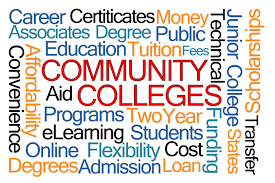Education
The American Community College: Invisible in Plain Sight
An accessible, affordable, solid foundation for building a successful career.
Posted October 3, 2019 Reviewed by Davia Sills
Looking does not always include seeing!
Do you know that one of the 1,100 exceptional U.S. community colleges is within driving distance of your home? In fact, the community college near you may be your best answer for reducing the high-tuition dilemma that has become a painful national concern. Research shows that the importance and value of community colleges are not well understood or even known by many, yet there are presently more than 10 million college students whose annual tuition is between zero and $12,320 (Forbes, 2019).
If you are one of those considering more education, your smartest move may be to explore your local community college for your answer. If you have family members reaching college age or adults seeking further education within your network of friends, please share your story. If you have attended a community college, please share your story.
There is no need to graduate from college with a mountain of debt and no prospect of a job (Huffington Post, 2019). Following are some of the compelling reasons:

Community colleges and achieving the American dream
Community colleges provide high-quality career and occupational programs necessary for our 21st-century workforce and offer a major solution to the staggering high-tuition barrier (Luskin, 2011).
A cornerstone of American higher education, community colleges enroll more than half of all college students, from entering freshmen to career-focused adults, and include a majority of African American, Latino, Caucasian, and Asian students, most of the low-income, first-generation citizens from anywhere, older students, veterans, most of our high-school graduates, and adults with special needs (Cohen, A. M., Brawer, F.B., Kisker, C.B. 2014).
In 1948, President Harry S. Truman established the Truman Commission to study the changes in our country and the needs of returning WWII veterans. The Truman Commission Report recommended that there be a college in every community, “within driving distance and accessible to every adult American.”
As with oxygen, the American community college is accessible, affordable, yet "invisible in plain sight."
The nature of families is to form, grow, and change. Children grow into adults, advancing and, hopefully, learning about alternative futures from which to choose. As life moves forward, year-by-year, the stories of those who have received opportunities through successful community college experiences need to be repeatedly told to inform those who are unaware. The powerful oral tradition of storytelling shares accomplishments and perpetuates knowledge from class to class, year to year, and generation to generation.
Hearing the success stories of others helps many individuals gain insight into how to make personal progress. Research confirms that part of making progress is based on being informed and knowing what to do. For this reason, it is important that good ideas and success stories about educational accomplishment be repeated by all of those with a story to share.
A century full of good stories
American culture has changed dramatically since the first community college campus, Joliet Jr. College, opened in Joliet, Illinois, more than 100 years ago. Life since 1901 has become increasingly complex, stressful, and demanding. American workers have transitioned from agrarian and industrial jobs to work in the new information and knowledge careers of today. The past is prologue for a breathtakingly transformed workforce entering a future in professions and career occupations that didn’t exist a mere decade ago.
A community college education is a way to build a solid foundation to extend one's reach and create the opportunity to transfer to a university and earn a license or an occupational certificate. Community colleges offer quality education at lower tuition as a smart alternative for college freshmen, sophomores, and adults interested in earning a two-year AA degree in career and/or occupational programs. Community colleges offer a solid transfer pathway to further higher education or entering an economically rewarding career track.
New 5G digital and advancing neuro-technology will explode our digital and robotic world!
The United States is at the center of worldwide, work-altering technology and the resulting new career explosion. American community colleges will continue to be central in providing the essential labor and professional service personnel who are the essence of our economy. Technical occupations, such as agri-business, airframe and power, flight technology, manufacturing, solar and environmental science, bookkeeping, accounting, nursing, exotic animal management training, political science, cyber-security, criminal justice, and more, will be at the center of surging changes ahead.
As additional examples of those who have benefitted from community colleges, more than 50 percent of the members of the California legislature attended community colleges. More than 70 percent of returning veterans attend community colleges. Most nurses and many allied health professionals come from community college programs. Most first-responders, police and fire personnel are prepared in community colleges. Most first-generation and immigrant citizens attend community colleges. Community colleges are an under-recognized, yet major, part of an answer to rising tuition concerns. And our community colleges are central to the public education and workforce needs of every community in which they are located.
Community colleges are widely acknowledged as the best bargain in higher education. They are a smart step forward for high school graduates and working adults pursuing careers or interested in continuing their quest for higher education.
Simple awareness is key in making decisions
Many community colleges offer more than 100 occupational programs. Yet the story still needs to be told and, importantly, re-told so that the economic value and transformative social contribution is understood and passed on as families grow and flourish and students advance, decade by decade. Awareness of the success of others is very helpful.
California's higher education system is taking significant steps to highlight community colleges. The University of California is now giving emphasis to the Transfer Admissions Guarantee (TAG) program at the University of California and the Associate Degree Transfer (ADT) program for California State University transfers. Community college transfers are central to necessary vertical P-20 articulation that benefits everyone from pre-school through advanced university degrees. Other states are also taking important steps to serve and inform the public about community college opportunities.
I have served as CEO of eight colleges and universities. Five were community colleges. I have taught in seven university doctoral programs emphasizing community college leadership, been CEO of Fortune 100 companies, and served as a mentor, coach, and counselor for many successful business and community college leaders, parents, and students.
I am a first-generation American whose parents immigrated from Ukraine as political refugees fleeing discrimination. I found my way, to a large extent, by attending and graduating from a community college. I learned the way from friends and associates who told me about their experiences and accomplishments.
Famous community college alumni who have shared their community college stories include:
- Steve Jobs, De Anza, College
- Ross Perot, Texarkana Junior College
- Clint Eastwood and Morgan Freeman, Los Angeles City College
- Tom Hanks, Chabot College
- Nolan Ryan, Alvin Community College
- George Lucas, Modesto Community College
- Eddie Murphy and Billy Crystal, Nassau Community College
- Arnold Schwarzenegger, Santa Monica College
- Halle Berry, Cuyahoga Community College
- Queen Latifah, Borough of Manhattan Community College
- Debbie Reynolds, Long Beach City College
- Bo Derek, El Camino College
The cows won't stay milked!
Simply stated, the community college is a uniquely American contribution to worldwide higher education. Sharing the important story of the American community college and the opportunity it offers is one of the best ways to help address the college tuition dilemma. AACC Past President Dale Parnell, my old boss, used to urge repeating the story again and again, because, he said, "The cows won't stay milked!"
It is important to repeatedly share beneficial information that people don’t know. If you are one who benefited, please add your story. All adults who choose to attend a community college and benefit from the quality programs and advantageous costs are encouraged and welcome. Community colleges are more important to the future of our citizens, state and nation than ever before!
Please forward this article to a friend and encourage sharing the story!
Definitions:
*P-20 is the organizational structure for vertical communication that is evolving to assist in perpetuating communication about educational opportunity. Pre-school through Graduate School (P-20) councils are being formed nationwide and are one way the open communication pipeline is fostered within communities.
Luskin Learning Psychology Series No. 48
Email comments or suggestions to: Bernie@LuskinInternational.com
References
Special thanks: Toni Luskin, Ph.D., for editorial and publishing assistance. Arthur C. Cohen, Ph.D., Professor Emeritus, UCLA, and Carrie B. Kisker, Ph.D., co-authors, The American Community College, and Christina (Tina) Christie, Ph.D., Chair, UCLA Department of Education and Marcelo Suarez-Orozco, Ph.D., Dean, Graduate School of Education and Information Studies for advice and counsel
Cohen, A. M., Brawer, F.B., Kisker, C.B. (2014). The American Community College. San Francisco. Jossey-Bass.
This is the authoritative book on community colleges. Anyone who wants to understand these complex and dynamic institutions, how they evolve, the contributions they make, the challenges they face, the students they serve, and the faculty and leaders who deliver the services and the curricula - will find The American Community College both essential reading and an important reference book.
Luskin, B. J. (2002). Casting the Net Over Global Learning. Los Angeles, Griffin.
Luskin, B.J. (2011). Legacy of Leadership, Washington, DC., W.K. Kellogg Foundation
Snyder, T. (2012). "Community College Success Stories." Huffington Post.
*Community Colleges offer an affordable quality answer to the high tuition dilemma.




